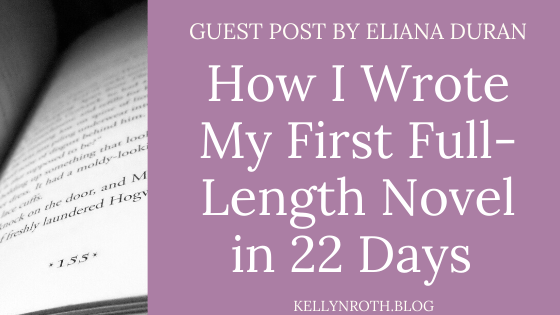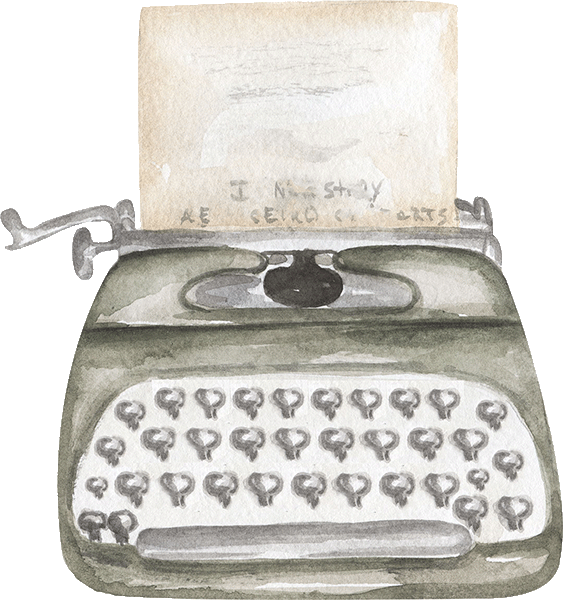
Hello folks! Kellyn here, but today I won’t be writing the main blog post – a fellow writer of mine, Eliana Duran, will!
Eliana shares her experience writing her first full-length novel in 22 days today with you. Without further ado … here’s her post!

How I Wrote My First Full-Length Novel in 22 Days
I remember vividly that feeling I had on the morning of June 22nd.
Before June 22nd, I had always thought that I would be ecstatic when I wrote the last word of my novel, Senses. I had imagined that the milestone would bring terrific excitement.
But instead of running around the house shouting, when I finished my novel, I was stunned.
This was different from the time that I had finished my first novella, Booker Bunny, after years of on-and-off work. This was different from the time I had finished completely rewriting Booker Bunny.
I had just written my first full-length novel–50,000 words of hard work–in 22 days.
I had never considered myself a rapid writer, and I still don’t, so I was surprised when I surpassed my ambitious goal of writing my first novel in a single month. But looking back, I can see several things that led to my success. Today, I’m going to share those with you.
Even if you are a slow writer, even if you have never written a full-length novel before, I believe that you can do it if you put in the preparation and effort. I hope these tips will help you find success in your writing-a-novel-in-a-month endeavor, just like they did for me.
#1: Who says you have to write it in November?
One of the biggest reasons that I was able to find the time to write over 1,667 words a day was that I chose a month that worked for me.
June was perfect for me because the only school I had to do was math and most things were canceled because of the Coronavirus. I was able to set aside entire mornings for writing, and then do my chores and other responsibilities in the afternoon.
Sure, it might feel like a big accomplishment if you write a whole novel in a month during the school year, but I found it wiser to choose a month that actually helped me fit the novel in my schedule. Writing a novel is already a huge accomplishment on its own!
If there’s a month that would work better for you than November, have your own unofficial NaNoWriMo and go beat your goals to a pulp!
#2: Hide it under a bushel–no!
If you think you are going to get away with writing for several hours a day for a month and then surprise your family with a novel all of a sudden, burn that idea right now. Your family (and friends!) can be some of your greatest assets, so use them!
A goal as big as this needs accountability. If nobody knows about your great novel writing expedition, then you could easily quit as soon as the going gets tough. And you don’t want to do that! If you tell your family and friends, you’ll be much more likely to follow through.
A second reason you shouldn’t hide your novel-in-progress under a bush is that if your family isn’t rooting for you, they’re going to weigh you down. Parents asking you to stop writing and go do laundry… siblings (I have ten of ‘em) interrupting to tell you their latest shenanigans… friends who keep messaging you, wondering why you are not responding… Not very helpful. But what if they not only stayed away from your precious writing time, but even cheered you on?
Now you might be asking, “How do I approach my parents about this in the first place?” Good question!
If you think that part will be difficult, you are not alone. I thought my parents would shoot the crazy idea down right away. So when I approached them several months ahead of time, I even made flashcards!
But my parents saw all the thought I had put into it, decided to support me, and even let me move chores to early afternoon so I could write in the morning. It was definitely worth talking to them first.
My parents also gave me valuable input. For example, I had originally planned to write my novel in July, but my mom suggested June, and that turned out to be a lot better for me.
A few points to include when you talk to your parents:
- Is writing a novel in a month possible? Totally! Hundreds of thousands of writers have done it, and a lot of young writers too!
- How will this help you? (E.g. learning to finish your story, write consistently, discipline yourself, outline, turn off your inner critic, etc, etc.)
- What will the commitment be? Try timing yourself writing 1,667 words ahead of time. It may take a good amount of time, but lots of serious musicians practice for several hours a day, so a serious writer can too.
#3: Even if you think you’re a pantser, please, please at least try outlining!
I didn’t consider myself a plotter, but I wrote a 3,000-word outline and it helped so much! Except for very minor cases, I pretty much never got writer’s block, and I always knew exactly what I needed to write next.
I know, I know, you pantsers are probably all whining that outlines suck the lifeblood out of you. But if you haven’t written an outline before, at least give it a try.
When I wrote mine, I discovered that I actually enjoyed planning my novel, and it made me even more excited to write. I had only sketched a few plot points for my other book, Booker Bunny, so I had never discovered that side of myself before. And I’m so glad that I tried it.
And honestly, if you are going to write your whole book in a month, you are going to need to prepare ahead of time and know where you are going. It is possible for you to successfully get through it pantser style, but writer’s block could make that extra difficult.
Also, it was very important to me that I came out with a novel and not just another novella, and my outline helped me do that. I made sure that I had enough scenes to work with, and I was able to reach 50,000 words.
To get started with outlines, I highly recommend Abbie Emmons’s YouTube channel, and if you are a visual person, also check out this article on Helping Writers Become Authors, specifically for the infographics.
#4: Take advantage of that initial excitement!
One of the greatest advantages of starting a new project for your 50,000 words expedition is the initial excitement that comes with beginning something fresh. You may think that it would be better to pace yourself and stick to 1,667 words a day, but I say take advantage of your excitement and write as much as you can.
On my first day of writing Senses, I beat my all-time words-in-a-day record with 4,437 words. It showed me that I could do this. I could write this novel in a month if I put in the time and effort.
Through the rest of the 22 days, my daily word counts looked like this:

Some of my greatest writing spurts were near the beginning–when my new project was just so fun!–and the end–when I could see the light at the end of the tunnel. (The spike in the middle was probably because my midpoint was one of the most exciting parts of my book.)
If I had not taken advantage of that excitement and paced myself instead, I probably would have taken longer to finish the novel. So take your initial excitement to its full potential!
And take advantage of any excitement in general, too. Don’t stop in the middle of a scene just because you’ve written your 1.7K. And if you are really close to the 10,000 word mark and eager to reach it, keep going!
#5: Conserve your mental energy!
At the same time, make sure you conserve your mental energy. You are going to need all the brainpower you can get to pull a novel out of your think tank. Here are a few things that might help:
- Try writing in the morning. I hadn’t considered myself a morning writer, but it was super helpful for me. And since I got up early to write, I didn’t need to peeve my parents by staying up late. Win-win! If you are truly a night owl writer and your parents are okay with it, by all means do write during your prime writing time. But mental energy-wise, morning can be an awesome time to write.
- Walks are very helpful! I convinced one of my brothers (who also happened to be a good brainstorming buddy) to get up early for quick walks with me before I wrote. This gave me accountability to get up early, refreshed my mind, and got me ready to write!
- Even if you don’t walk or do some sort of exercise before you write, make sure you don’t write after something mentally draining. For me, writing and math do not go well together. In fact, some days near my math deadlines, I needed to move my math to the morning because my writing wasn’t leaving enough mental energy for it. (I was already way ahead of my goal, so I didn’t mind.) Conserve your mental energy and use it wisely.
- Spread your writing throughout the day. If you don’t have the mental energy to do everything at once, that’s fine. Just go back to it later. Also, make sure that you don’t procrastinate all your writing for the evening because then you might not be able to do it all.
#6: Give yourself permission to write garbage.
This is the whole point of writing a novel in a month. Learning to word vomit so much that you actually finish something.
As a writer who likes to go slow and steady and get all those typos, it was hard. With how much I was writing, yes, there were days that I came out with jewels, but there were also days that I just had to slog through, writing stuff no reader would want to read.
In order to get through, you need to give yourself permission to write garbage. Turn off the red line spell checker option, and just write whatever words come to mind first. You may end up – writing sentences like “McKenzie sat on Corutney’s bed and Linaneus saw on the chair my her desk,” or “McKenzie did stuff with Courtney,” but that’s what it takes to reach your goal.
If you notice something, just make an ALL CAPS note in [brackets] to fix it later. Depending on your program, you might be able to make a comment. But if you put it straight on the document, it will count as words. 😉
Then just keep swimming. Focus on typing the next sentence, the next word, the next letter.
Eventually, you too may find yourself writing the last letter in the 50,000th word.
Are you hoping to conquer a big goal in the future? I’d love to help you. Let me know if you have any questions in the comments!

Eliana Duran is a homeschooled high school sophomore with a love for words. Besides when she is writing, you can often catch her doodling or reading.
She loves Jesus first of all, and also the color purple, mint chocolate chip ice cream, and her ten younger siblings (most of the time).
She regularly posts on her blog, Eliana The Writer.
TTFN!
~Kell~
P.S.
To quote Eliana: “Are you hoping to conquer a big goal in the future? I’d love to help you. Let me know if you have any questions in the comments!”
Want to keep getting amazing posts in your inbox? Follow my blog on the sidebar!


26 Responses
Great post!! Thank you!!
You’re welcome! I hope it was helpful to you. =)
For sure, Katja! 😀
Wow! This was super interesting! Thanks for sharing!
I am glad to hear that! =) Thank you for reading!
Also glad it was helfpul! Thank you! 😀
*and typo: helpful!
Congratulations Eliana! Writing a novel is quite a significant accomplishment and you did it in less than a month! Wow!
Thank you! =) It was very fun!
I loved this post! 😀
It’s pretty awesome!
Thanks you!! =)
I have a question for you, 😉 what was the hardest part of your novel to write? I struggle with endings because I’m better at building things up than winding them down.
Ooh, hmm… Yeah, I didn’t bother much with the ending. XD I mostly just wanted to finish the novel, so I sped through it. The group interactions were pretty trickier. I had some meetings in there that were mostly adults, and it was difficult to juggle the personalities and the discussions weren’t very fun to write overall. =P
Ah. Neat!
Thank you for this post! I have been getting more serious about writing, and completing a full-length is a new goal of mines (whether it’s within a month or 5!). I hope to accomplish this goal either this year or next year, but either way, I just want to continue to improve my writing. 🙂
Ooh, best of luck! You can do it!
That’s awesome! =) You’ve got this!!
This is awesome, Eliana! I completed my 92,000-word novel in a month, so I know how you feel!! It’s wonderful!!
That’s awesome, Samuel! Yes, I adore that feeling of productivity!
Yes!! It feels amazing! (Congrats again, by the way! ;))
That post was so helpful, Eliana, thank you! I especially like the advice about getting up early and walking with your brother. I may just try that!
You’re welcome, Lili! I’m glad you found it helpful. =) Yes, that was super helpful for me! If you try it, I hope it works well for you!
Thank you for sharing this, Eliana! (I was wondering how on earth you managed to write an entire novel in a month 😉 )
I might have to try this with my new WIP.
You are very welcome! =) (I wonder that too. XD) I hope your WIP goes well!!